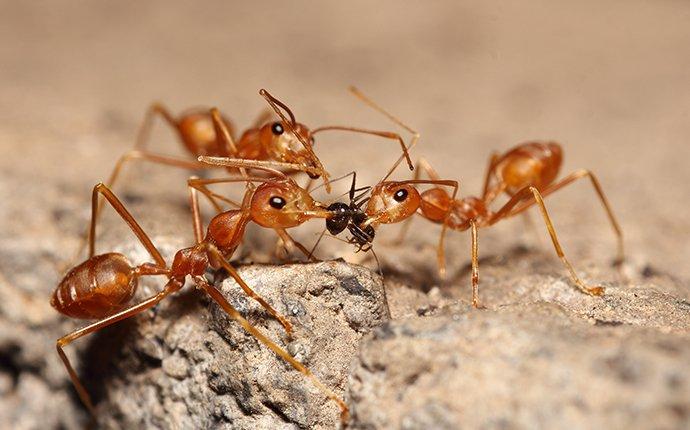Reliable Ant Control: Specialist Services to Remove Ant Infestations
Reliable Ant Control: Specialist Services to Remove Ant Infestations
Blog Article
Ecological Influence of Insect Control: Balancing Performance With Sustainability
The ecological influence of parasite control is a vital concern that needs a delicate equilibrium between attaining effectiveness in ensuring and taking care of parasites sustainability of our environments. As we strive to secure our plants, homes, and health from the threats postured by insects, the techniques we employ can unintentionally harm the atmosphere. From making use of hazardous chemicals that seep into our soil and water to the unexpected consequences on non-target species, the repercussions of standard pest control practices are far-reaching. There are arising methods that use hope for an extra lasting technique to pest administration. These services not just purpose to resolve the prompt bug issues yet additionally consider the long-term health of our planet.
Harmful Chemicals in Pest Control
The application of unsafe chemicals in parasite control positions substantial ecological and health and wellness threats that require cautious consideration and reduction approaches. Insecticides, pesticides, and herbicides are typically used to eliminate bugs, yet their extensive application can cause unintentional repercussions. These chemicals can pollute dirt, water resources, and the air, affecting not only the targeted pests yet also helpful pests, wild animals, and people.

To attend to these risks, integrated insect management (IPM) strategies are being advertised as a more lasting option. IPM entails a combination of approaches such as organic control, environment manipulation, and the targeted use chemicals as a last option (ant control mocksville nc). By adopting an all natural technique to pest control, we can decrease the environmental and health and wellness impacts related to damaging chemicals while properly handling pest populaces
Influence On Non-Target Variety
Taking into consideration the unintended repercussions of bug control techniques, the influence on non-target types is a vital facet that needs detailed evaluation. While bug control steps intend to target specific bugs, various other microorganisms in the environment may be unintentionally impacted. Non-target species, consisting of advantageous pests, birds, creatures, and also plants, can endure indirect or direct harm from pesticide applications or organic control approaches.
Insecticides created to battle a specific bug bug might harm pollinators like or natural killers such as ladybugs. Organic control representatives, if not species-specific, can present risks to unplanned targets, interfering with the ecological balance.
To alleviate the impact on non-target species, incorporated insect management (IPM) approaches that highlight an alternative technique to pest control are advised. These methods focus on making use of eco friendly techniques, minimizing harm to useful microorganisms while efficiently managing pest populations. Carrying out detailed threat assessments and checking the outcomes of pest control initiatives are necessary action in safeguarding non-target varieties and promoting general community wellness.
Dirt and Water Contamination
Unplanned ecological effects of insect control methods extend past influencing non-target varieties, with considerable effects for dirt and water contamination. Pesticides, herbicides, and chemical fertilizers used in pest control can leach into the soil and infect groundwater, posing a risk to both water and terrestrial communities. Soil contamination can interfere with the equilibrium of bacteria vital for nutrient biking and plant development, bring about decreased dirt fertility and performance. These chemicals can linger in the setting for prolonged durations, collecting in the soil and possibly entering the food chain.
Water contamination is an additional vital problem connected with parasite control techniques. To minimize soil and water contamination from pest control tasks, incorporated parasite management techniques that focus on sustainability and lessen chemical inputs are vital.
Air Pollution From Chemical Usage
Direct exposure to airborne chemicals during farming applications postures a significant problem for air contamination control measures. In addition, pesticide drift, where chemicals are carried by the wind to unplanned areas, can lead to the contamination of nearby communities and water bodies.

Techniques for Lasting Bug Control
In the world of farming methods, applying sustainable parasite control techniques is critical for preserving ecological equilibrium and guarding plant yields. Lasting insect control emphasizes making use of eco-friendly methods to take care of bug populations successfully while minimizing injury to non-target microorganisms and ecosystems. Integrated Pest Administration (IPM) is a widely taken on strategy that combines organic, social, physical, and chemical control techniques to attain long-term parasite monitoring options.
One secret approach in lasting insect control is advertising biodiversity within agroecosystems. By boosting natural opponents of parasites, such as parasitoids and predators, farmers can lower the requirement for synthetic pesticides. Crop turning and diversity are additionally efficient techniques to interrupt pest life process and produce much less beneficial conditions for parasites to flourish. Additionally, using pest-resistant crop selections and employing techniques like trap cropping can help in reducing bug stress without relying greatly on chemical interventions. Eventually, by integrating these sustainable parasite control strategies, farmers can attain a balance between pest management performance and environmental stewardship.
Conclusion
Finally, the ecological effect of parasite control techniques must be thoroughly thought about to stabilize performance with sustainability. Hazardous chemicals used in parasite control can cause soil and water contamination, air pollution, and harm non-target varieties - termite control. It is critical to apply lasting parasite control techniques to minimize these negative impacts on the setting and promote a much healthier environment for future generations
By embracing an all natural method to pest control, we can lessen the environmental and wellness influences connected with hazardous chemicals while successfully managing pest populaces.

To alleviate the air pollution created by chemical usage, it is important to embrace integrated insect monitoring strategies that prioritize the usage of non-chemical bug control approaches, such as crop get redirected here turning, all-natural predators, and immune crop ranges. Sustainable bug control highlights the usage of ecologically pleasant approaches to handle parasite populaces efficiently while lessening injury to non-target microorganisms and ecosystems. Integrated Insect Administration (IPM) is a widely taken on method that combines organic, cultural, physical, and chemical control approaches to achieve lasting bug administration services.
Report this page